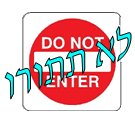Hareidi.org's Kosher Internet
This page is under construction.
First of all, let us say that "Kosher internet" does not exit, yet. There is no known solution to the various problems that internet poses to a hareidi family. There are partial solutions and this article discusses them.
In addition, hareidi.org recognizes that pornography and sexually abusive content on the internet is a significant problem that affects both families who do not follow the rulings of the haredi rabbinical authorities, as well as those hareidim who are required and permitted to use the internet.
The reports on the quantity and popularity of this material on the internet[1] (reaching, according to some estimates, 20%-30% of non-commercial internet usage) are astounding. The medical reports on the health and psychological aspects of this problem[2] reflect a medical problem which is attracting the attention of both Jews and non-Jews wordwide.
This article is devoted to explain the issues involved, and recommend possible solutions.
Contents
Rabbinic response
In 5765 (2005), after examining internet filtering technology, various ISP's offering "kosher" service, and reviewing the number of case where individuals in religious households were affected by this problem, it was ruled that current technology does not provide adequate safeguards to prevent these problems. It was ruled that internet usage must be reduced or eliminated, and for the first time the Gedolei Hador took the unusual step of requiring physical security of any internet appliance, and externally verifiable compliance by religious households.
- Reducing usage means "casual" internet usage is forbidden. This means that using the internet for entertainment, online shopping or even education. In general the only two permitted reasons for using the internet were parnasa (making a living) and kiruv (jewish outreach).
- Physical security means that any internet capable device must be disabled, even if not physically connected at the time to an internet service providor. Desktop computers, laptops and palm computers must stored in a locked room, and whenever they are used, they should not be used in such a way to lead others in the household (particularly children) to think that being used in a casual way.
- Externally verifiable compliance means that individuals are not trusted to decide for themselves whether their usage qualifies as allowed usage, but are required to go to ask a shailah of a Rabbinical authority and receive a legal decision.
In summary, it was decided in 2005 that internet filters and add-on software were considered inadequate and of no consequence, due to the "mistakes" these systems make and the ease that they can be bypassed (by connecting alternate software, proxies, or even using the account on another machine). It is clear that the ideal hareidi home is without a computer, much less one connected to the internet.
Takana of Lakewood
One example of this legal ruling is the Takana of Lakewood[3]
- Internet access is only permissible if required for a person’s job, and should be done at work.
- Internet access in the home is prohibited if it is only for the purpose of entertainment or casual use (shopping, airline tickets etc.)
- Anyone who requires access to perform their jobs should be required to have a Rabbi certify the validity of this need.
- Computers with internet access must be physically protected from use (in a locked room, etc), as current software filtering technology is not sufficient to protect their use.
- Computers even without internet access will be required to have software installed which will prevent them from being configured to connect to the internet by the use of external modems, WIFI etc.
